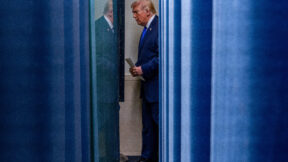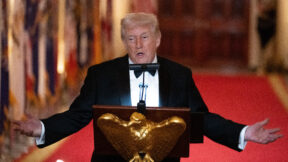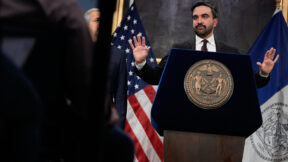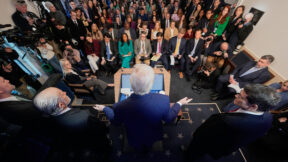Pope Francis Dead at 88

AP Photo/Alessandra Tarantino
Pope Francis died at the age of 88, the Vatican announced on Monday morning.
Born Jorge Mario Bergoglio on December 17, 1936, in Buenos Aires, Argentina, Pope Francis was the first pope from the Americas and the Southern Hemisphere. He was raised in a family of Italian immigrants, and his early life was marked by challenges, including a severe lung infection that led to the partial removal of one of his lungs. Bergoglio entered the Society of Jesus (Jesuits) in 1958, taking vows in 1960.
He was ordained a priest in 1969 and rapidly advanced within the Jesuit order, becoming provincial superior of Argentina in 1973. During Argentina’s brutal military dictatorship, Bergoglio’s leadership was marked by his commitment to human rights. However, his role during this period was not without controversy, particularly his fierce commitment to protecting the poor among us.
From his page on The Vatican site:
My people are poor and I am one of them,” he has said more than once, explaining his decision to live in an apartment and cook his own supper. He has always advised his priests to show mercy and apostolic courage and to keep their doors open to everyone. The worst thing that could happen to the Church, he has said on various occasions, “is what de Lubac called spiritual worldliness”, which means, “being self-centred.” When he speaks of social justice, he calls people first to pick up the Catechism and rediscover the Ten Commandments and the Beatitudes. His project is simple: if you follow Christ, you understand that “trampling upon a person’s dignity is a serious sin.”
Bergoglio was appointed Archbishop of Buenos Aires in 1998 and was made a cardinal in 2001 by Pope John Paul II. Known for his humility, pastoral care, and dedication to social justice, he was a vocal advocate for the poor and marginalized. His focus on simplicity and austerity led him to adopt a modest lifestyle, rejecting the luxurious trappings of the church.
On March 13, 2013, Bergoglio was elected pope after the sudden resignation of Pope Benedict XVI. As Pope Francis, he emphasized a message of mercy, dialogue, and reform, particularly within the Catholic Church. He has worked tirelessly to address global issues, including poverty, climate change, and migration. His papacy is also noted for its push for church reform, with a focus on decentralizing power, promoting interfaith dialogue, and improving relations with other Christian denominations. Despite facing internal church resistance, Pope Francis remains a figure of moral authority and compassion on the world stage, shaping the future of the Catholic Church in profound ways.
Pope Francis was unafraid to speak out against political rhetoric with which he disagreed, even calling out comments made by Vice President JD Vance in protest of President Donald Trump’s planned “mass deportations.”
Pope Francis, 88, had faced serious health complications, primarily involving respiratory distress. On February 14, he was hospitalized for breathing difficulties and diagnosed with double pneumonia. His medical team found that low platelet counts, anemia, and a lung infection further complicated his condition. High-flow oxygen therapy was administered, and blood transfusions were given to stabilize his condition.
On February 22, Pope Francis experienced a prolonged respiratory crisis, requiring continued oxygen support. Tests also indicated early kidney failure, which has added complexity to his treatment. His medical history includes a partial lung removal in his youth, which has left him vulnerable to such respiratory issues.
New: The Mediaite One-Sheet "Newsletter of Newsletters"
Your daily summary and analysis of what the many, many media newsletters are saying and reporting. Subscribe now!






Comments
↓ Scroll down for comments ↓